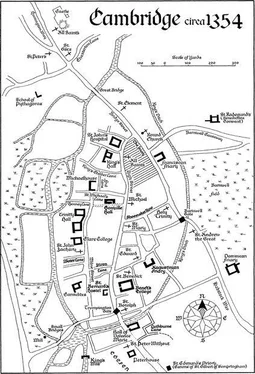‘Brother Michael of Michaelhouse,’ replied Heytesbury. ‘What are you doing here?’
‘You two have already met?’ asked Richard, surprised that the Oxford scholar, who now reclined in the Stanmores’ best chair with a brimming goblet of wine, should be acquainted with the likes of the obese Benedictine. ‘How?’
‘We are in the middle of certain negotiations,’ replied Michael vaguely. Although his plans to pass two farms and a church to Oxford in exchange for information were not a secret, he was evidently not prepared to elaborate on them for Richard’s benefit. He raised his cup to the Merton man. ‘Your health, Master Heytesbury. I was not expecting to see you until well after Easter.’
‘The roads have been dreadful,’ replied Heytesbury, stretching elegant legs towards the fire. ‘The snow and rain have turned them into one long quagmire from Oxford to Cambridge. I decided to start the journey early, so I would not be late for our meeting.’
‘But that is not until Ascension Day,’ said Michael, raising his eyebrows. ‘Six weeks hence. The roads are not that bad!’
Heytesbury gave a small smile. ‘True. But I have other business in Cambridge, besides the agreement I am making with you.’
‘Such as what?’ asked Michael, affecting careless indifference, although Bartholomew caught the unease in his voice.
Michael had already gambled a great deal on the success of his arrangements with Merton, and did not want them to fail. Bartholomew was hazy on the details, but he knew that the seemingly worthless information and documents Heytesbury would pass to Michael would eventually be worth a lot more than two farms and a church. Michael anticipated that he would be able to steal the patronage of some of Oxford’s wealthiest benefactors, and that Cambridge would ultimately emerge richer and more powerful than her rival University. Bartholomew knew that Heytesbury was under the impression that the monk wanted the information simply in order to secure himself the post of Chancellor in a year or two. For all Bartholomew knew, there could be an element of truth in that, too.
Heytesbury was an influential figure in the academic world. He had written a number of books on logic and natural philosophy, and was a leading proponent of nominalism. He was also a member of Merton, one of the largest and most powerful of Oxford’s colleges. Bartholomew recalled listening to lectures given by Heytesbury during his own days there.
He studied the Oxford man with interest. In the flattering half-light of the fire and the lamps, it seemed the years had been kind to Heytesbury. He had been an intense young man in his twenties when he had first started to make a name for himself with his scholarship, and Bartholomew supposed he must now be nearing fifty. However, his face had retained its smooth skin and his brown hair was unmarked by grey; these, combined with his slight, boyish build, had led many an academic adversary to underestimate him in the debating chamber. Such opponents did not make that mistake a second time. But despite his superficially youthful appearance, the physician in Bartholomew detected a certain pouchiness beneath Heytesbury’s eyes and a slight tremble in his hands.
Heytesbury continued to smile at Michael. ‘My other work involved meeting one of your scholars with a view to taking him to Oxford. It was nothing that would influence anything you and I have discussed, so do not be concerned.’
‘Poaching,’ said Michael immediately. ‘It might not affect our agreement, but as Senior Proctor I cannot stand by and watch you entice away our best students.’
‘As luck would have it, he proved unsuitable,’ said Heytesbury. ‘I will not be taking him with me after all.’
‘What business could possibly bring a Cambridge monk and an Oxford philosopher together?’ asked Richard curiously. ‘Especially since Master Heytesbury told me today that he had never been to Cambridge before.’
Then Heytesbury was lying, thought Bartholomew, listening to the philosopher explaining to Richard that the correspondence between him and Michael had been by letter. Bartholomew remembered very clearly the last time he had seen Heytesbury – at a clandestine meeting on some wasteland in Cambridge the previous year. Heytesbury had been trying to learn from a mutual acquaintance whether Michael was a man to be trusted. Fortunately for Michael, the friend put allegiance to Cambridge above an ancient friendship, and had encouraged Heytesbury to proceed in his negotiations with the monk. Heytesbury, quite rightly, had been suspicious of an offer that seemed to favour Oxford, but the monk was hoping the man’s natural greed would encourage him to sign anyway.
Bartholomew noted that Heytesbury was as vague about their business as Michael had been, and supposed such subterfuge came naturally to men like them. He wondered what would happen if Heytesbury discovered that a number of people in Cambridge already knew that something was afoot between Michael and the scholar from Merton. Michael had been discreet, but the news had been announced the previous November – when Ralph de Langelee had wanted to make sure Michael was not elected Master of Michaelhouse and had used the Oxford story to stain the monk’s reputation – and it had not taken long for the word to spread. But Michael would not want Heytesbury to discuss the case with Richard, who knew that the monk was no bumbling incompetent whose sole ambition was for personal power, but a skilled manager of intrigues who would best even a clever man like Heytesbury, given the chance. Michael wanted Heytesbury lulled into a false sense of security, so that he would sign the agreement without his suspicions being raised.
‘You have explained why you came to Cambridge,’ said Michael, smiling politely at the Oxford man. ‘But you have not told us how you know Richard.’
‘I tutored him during his time at Merton,’ replied Heytesbury. ‘It was I who persuaded him to give up the notion of becoming a physician and to study law instead. It is safer than poking around with leprous sores and more stimulating than inspecting flasks of urine. And there is always a need for good lawyers these days.’
‘Yes,’ agreed Richard fawningly. ‘Ever since the Death, large numbers of wills have been contested, and so there is always work for those who understand the law.’
The conversation turned to legal matters, although Heytesbury did not join in. It was clear to Bartholomew that Heytesbury was uncomfortable with the notion that Michael might cheat him, and so had travelled to Cambridge to make more enquiries before he accepted the terms the monk was offering. Michael also said little, although his eyes gleamed as he sensed Heytesbury was worried enough to try to investigate him. Bartholomew saw that the monk anticipated a challenge, and was relishing the prospect of locking wits with one of Oxford’s greatest thinkers.
‘The food is ready,’ said Edith, entering the room from the kitchen, flushed from the heat of the fire that was roaring there.
‘Then let us begin,’ said Michael, rubbing his hands in gleeful anticipation. Bartholomew was not sure whether his words referred to the food, or to the impending battle of minds with Heytesbury.
Michael had been wise to inveigle an invitation to Edith’s house that night: the fare she provided was infinitely superior to anything that would have been on offer at Michaelhouse. There was trout stuffed with almond paste, pike in gelatine surrounded by roasted vegetables, followed by fried fig pastries, raisin slices and butter custard. Stanmore broached one of his barrels of best wine, a rich red from southern France, while Richard provided a flask of something that he claimed was the height of fashion in Oxford. It was a colourless liquid that tasted of turnips and that burned Bartholomew’s throat and made him cough. He wondered whether Richard would sell him some to use on those of his patients with painful bunions.
Читать дальше












